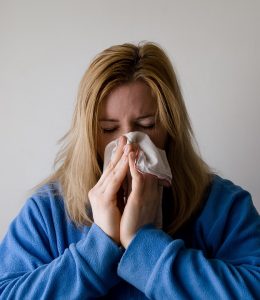You would never dream of driving drunk — but what about driving sick? What many people don’t realize is that driving while sick is just as dangerous as driving while intoxicated. Before you decide to tough it out at work today, consider these three reasons to stay off the road.
Impaired Reflexes and Concentration
You know how you feel foggy and tired when you’re battling a cold? That translates to slower reflexes and lower concentration while driving. Neither your brain nor your body are operating at full capacity; at high speeds, that extra second needed to process information or respond to an emergency make a huge difference.
If you think that sounds a lot like the reason you should call a cab after drinking, you are right. A few years ago, Young Marmalade, a British car insurance company, estimated that driving while sick could be the equivalent of driving after four double whiskeys. Driving is dangerous enough on a normal day; why take a chance when you’re not feeling well?
Drowsiness and Sneezing
Several factors make it harder to keep your eyes open when you’re sick — and keeping your eyes open is a very important part of driving. Headaches, drowsiness, and watery eyes all make a difference. You may find yourself extra sensitive to light or prone to dozing off. Wiping your eyes or even reaching for tissues can also take your eyes off the road.
Then there are sneezes. Recent studies have indicated that sneezing causes more than its fair share of accidents. Halfords Autocentres in Britain even did the math, estimating the you will travel 50 feet with your eyes closed if you sneeze while driving at 60 mph. Covering your mouth during a sneeze is such an ingrained motion that you may even take one or both hands off the wheel, and you definitely won’t be focused on driving during that moment.
The Influence of Medications
Medicine may help you feel better, but it won’t fix everything. In fact, depending on what you take, medicine could actually make things worse in terms of driving. Just think about some of the common side effects:
- drowsiness
- dizziness
- blurred vision
- slowed movement
- inability to focus
- nausea
- fainting
- excitability
The FDA has some helpful information on its website, including what to look for on the “Drug Facts” label of an over-the-counter medicine. Those you take for the common cold or allergies are among the worst offenders, as they often cause drowsiness. Even some pain relievers, diet pills, and antidepressants are dangerous. Keep in mind, too, that in many states, you can get in just as much trouble for driving under the influence of prescription or over-the-counter medications as illicit drugs or alcohol.
Next time you’re feeling under the weather, don’t take your driving skills for granted. If you can’t afford to call in sick, at least make other travel arrangements. Call a cab, ride the bus, or ask a friend for a favor. Keeping yourself — and other drivers — safe is worth the extra hassle.
Image from Pixabay licensed under CC BY 2.0


![[Facebook]](https://www.scottclarknissan.com/blogs/1043/wp-content/plugins/bookmarkify/facebook.png)
![[LinkedIn]](https://www.scottclarknissan.com/blogs/1043/wp-content/plugins/bookmarkify/linkedin.png)
![[Twitter]](https://www.scottclarknissan.com/blogs/1043/wp-content/plugins/bookmarkify/twitter.png)
![[Yahoo!]](https://www.scottclarknissan.com/blogs/1043/wp-content/plugins/bookmarkify/yahoo.png)
![[Email]](https://www.scottclarknissan.com/blogs/1043/wp-content/plugins/bookmarkify/email.png)


